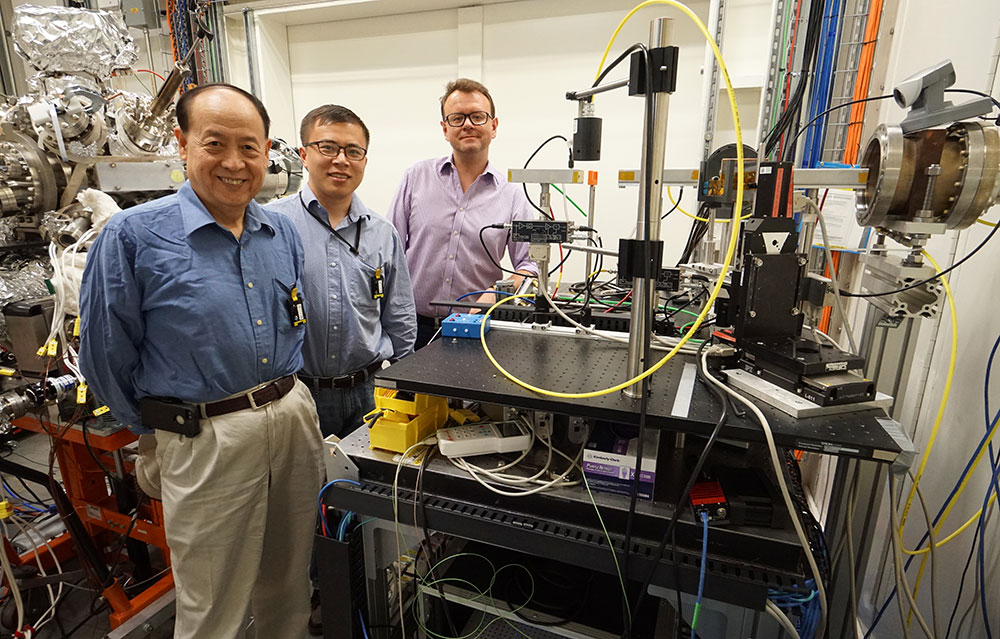Battery Scientist Honored by DOE's Vehicle Technologies Office
Contributions include developing techniques for studying, improving battery materials
July 30, 2024
 enlarge
enlarge
Battery chemist Xiao-Qing Yang (left) with colleagues Enyuan Hu and Eli Stavitski at the Inner-Shell Spectroscopy (ISS) beamline of the National Synchrotron Light Source-II at Brookhaven National Laboratory. (Brookhaven National Laboratory)
UPTON, N.Y. — Longer lasting batteries would allow electric vehicles (EVs) to drive farther and perhaps inspire more people to make the switch from fossil fuels. One key to better EV batteries is understanding the intricate details of how they work — and stop working.
Xiao-Qing Yang, a physicist who leads the Electrochemical Energy Storage group within the Chemistry Division at the U.S. Department of Energy’s (DOE) Brookhaven National Laboratory, has spent a good deal of his professional career doing just that. DOE’s Vehicle Technologies Office (VTO) recently recognized his contributions with a Distinguished Achievement Award presented during its 2024 Annual Merit Review. Each year, VTO presents awards to individuals from partner institutions for contributions to overall program efforts and to recognize research, development, demonstration, and deployment achievements in specific areas.
Yang was honored “for pioneering [the use of] advanced characterization tools, such as in situ X-ray diffraction and absorption, to analyze battery materials under operational and extreme conditions in support of VTO battery research and development (R&D) at Brookhaven National Laboratory over the last 38 years.”
These techniques use intense beams of X-rays — for example, at Brookhaven Lab’s National Synchrotron Light Source II (NSLS-II) — to study the atomic-level structure and chemical and electronic characteristics of battery materials in real time as the batteries charge and discharge under real-world operating conditions over repeated cycles. The use of these methods has been adopted at other synchrotrons throughout the DOE complex of national laboratories to provide scientists with a fundamental understanding of the relationship between the structure and the performance of battery systems. This research also provides guidance and approaches to design and synthesize new improved materials.
“This award recognizes the efforts of and honors the whole Electrochemical Energy Storage group, not just me,” said Yang. “Throughout my career, my goal has been to design and synthesize new high-energy materials with improved power density, longer cycle and calendar lives, and good safety characteristics,” he noted. “It’s great to see these efforts recognized as we try to move toward increased use of electric vehicles to meet our transportation needs.”
Xiao-Qing Yang earned a Bachelor of Science degree in material science from Xi'an University of Technology in China in 1976 and a Ph.D. in physics from the University of Florida, Gainesville, in 1986. He joined Brookhaven Lab’s Materials Science Department in 1986 and rose through the ranks, serving as a Principal Investigator (PI) in materials science from 1993-2005. Since then, he has been a PI in the Lab’s Chemistry Department (now Division), serving as group leader for the Electrochemical Energy Storage Group and as a lead PI and coordinator for several battery research programs funded by VTO within DOE’s Office of Energy Efficiency and Renewable Energy, including the Battery500 consortium. He received the 2012 Vehicle Technologies Program R&D Award and the 2015 International Battery Materials Association (IBA) Research Award. He is a member of the Board of Directors of both IBA and IMLB LLC, the organization that runs international meetings for lithium battery researchers, and he has served as an organizer and invited speaker at these and many other conferences.
Brookhaven National Laboratory is supported by the Office of Science of the U.S. Department of Energy. The Office of Science is the single largest supporter of basic research in the physical sciences in the United States and is working to address some of the most pressing challenges of our time. For more information, visit science.energy.gov.
Follow @BrookhavenLab on social media. Find us on Instagram, LinkedIn, X, and Facebook.
2024-22013 | INT/EXT | Newsroom









